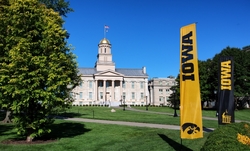ActionAid USA | 28 April 2021
University of Iowa faculty rebuke farmland investors for fueling land grabs and corporate takeover of agriculture
IOWA CITY, IOWA – On Tuesday, April 27, the University of Iowa Faculty Senate voted 42 to 7 to pass a resolution calling on the university to hold the financial services provider TIAA accountable for its investments in global farmland. Worth almost $8 billion, TIAA’s farmland investments have been linked to land grabbing and deforestation in Brazil and to corporate concentration, environmental destruction by monocrop industrial agriculture, and factory farming in the United States.
The Faculty Senate cast a resounding vote for the resolution even after the CEO and Director of Sustainability from TIAA’s farmland subsidiary, Westchester, gave virtual presentations to the Executive Council of the Faculty Senate. Faculty cited concerns that their retirement funds are being used to fund agricultural practices that are contributing to human rights abuses, accelerating climate change, and threatening the planet’s future.
“It is unacceptable that our retirement funds – money which we are saving for our futures – are being used in ways that are harmful to the environment and to communities in Brazil as well as in the U.S.,” said Dr. Laura R. Graham, a Professor of Anthropology at the University of Iowa.
Dr. Graham is an expert on human rights and on the impacts Indigenous Peoples and rural communities face due to toxic pesticide use and deforestation caused by agribusiness in Brazil.
The Faculty Senate resolution notes that financial speculation with farmland is risky, and many governments are recognizing that investor ownership harms farming communities and food sovereignty. As Bloomberg reported, a Brazilian government land regulating agency found TIAA’s acquisition of nearly half a million acres of Brazilian farmland since 2010 to be in violation of a law limiting foreign ownership of agricultural property. If these findings are upheld, TIAA could lose half a billion dollars worth of farmland.
Another Bloomberg article found that Harvard Management Company – Harvard University’s endowment and another major farmland investor with ties to TIAA – lost over $1 billion on natural resources investments, including over $250 million on farmland in Brazil.
“We don’t even use the word ‘investment’ to describe this because TIAA’s business is to speculate with the price of farmland. TIAA promotes mono-cropping plantations that pollute the soil and destroy food production of local communities. TIAA clients also face financial risks because of the destructive nature of this business,” said Maria Luisa Mendonça, Executive Director of Rede Social de Justiça e Direitos Humanos, the organization whose research was the basis for the Bloomberg articles.
Over the last decade, TIAA – which manages the retirements for almost five million professors and staff at colleges and universities across the country, as well as for nonprofits – has become the largest institutional investor in farmland in the world. It has acquired almost two million acres of farmland on four continents worth around $8 billion. Besides Brazil, TIAA also owns land in Australia, Eastern Europe, and the United States.
In the United States, TIAA owns hundreds of thousands of acres in the California Central Valley, the Mississippi Delta, and the Midwest. In the California Central Valley, farmland investors have been accused by neighboring farmers of taking water resources. The Atlantic reported that, in the Mississippi Delta, TIAA’s large farmland holdings have raised concerns that it bought farmland that was illegally taken from Black farmers over the past several generations through fraud and discrimination.
In addition to concerns about land and water grabs and racial discrimination, family farmers and faculty in Iowa are particularly concerned about financial companies buying farmland and how this might end family farming as we know it.
“TIAA’s investment goals encourage an intensive model of production that we are seeing here in Iowa: growing a few crops with the use of harmful chemical pesticides while raising millions of animals in confinements. This may be easy to manage, but it is very destructive. Rivers are polluted, soil is eroding, rural communities are hollowed out, and there are now far fewer families on farms,” said Patti Naylor, an Iowa organic corn and soybean farmer and member of the National Family Farm Coalition and Family Farm Defenders. “The financialization of farmland takes away opportunities for young, aspiring farmers and farmers already in the community to buy or rent that land.”
A coalition of family farmers, environmental justice, international human rights, faith-based organizations, and TIAA clients has pressured the company to stop speculating with farmland as a financial asset. TIAA’s farmland primarily produces commodity crops like corn and soybeans for biofuels and animal feed – not food. In addition to the environmental destruction caused by these commodities, the financialization of farmland poses serious threats to food security and the human right to food.
“Millions of people around the world are struggling due to poverty and inequality, yet TIAA wants to control farmland and what can be produced from it,” said Doug Hertzler, Senior Policy Analyst at ActionAid USA, University of Iowa graduate, and TIAA client. “TIAA’s way of farming does not get food to hungry people. It tries to sell retirees a false sense of security based on owning a small piece of a scarce resource, without addressing the harms done to the environment and to local communities.”












